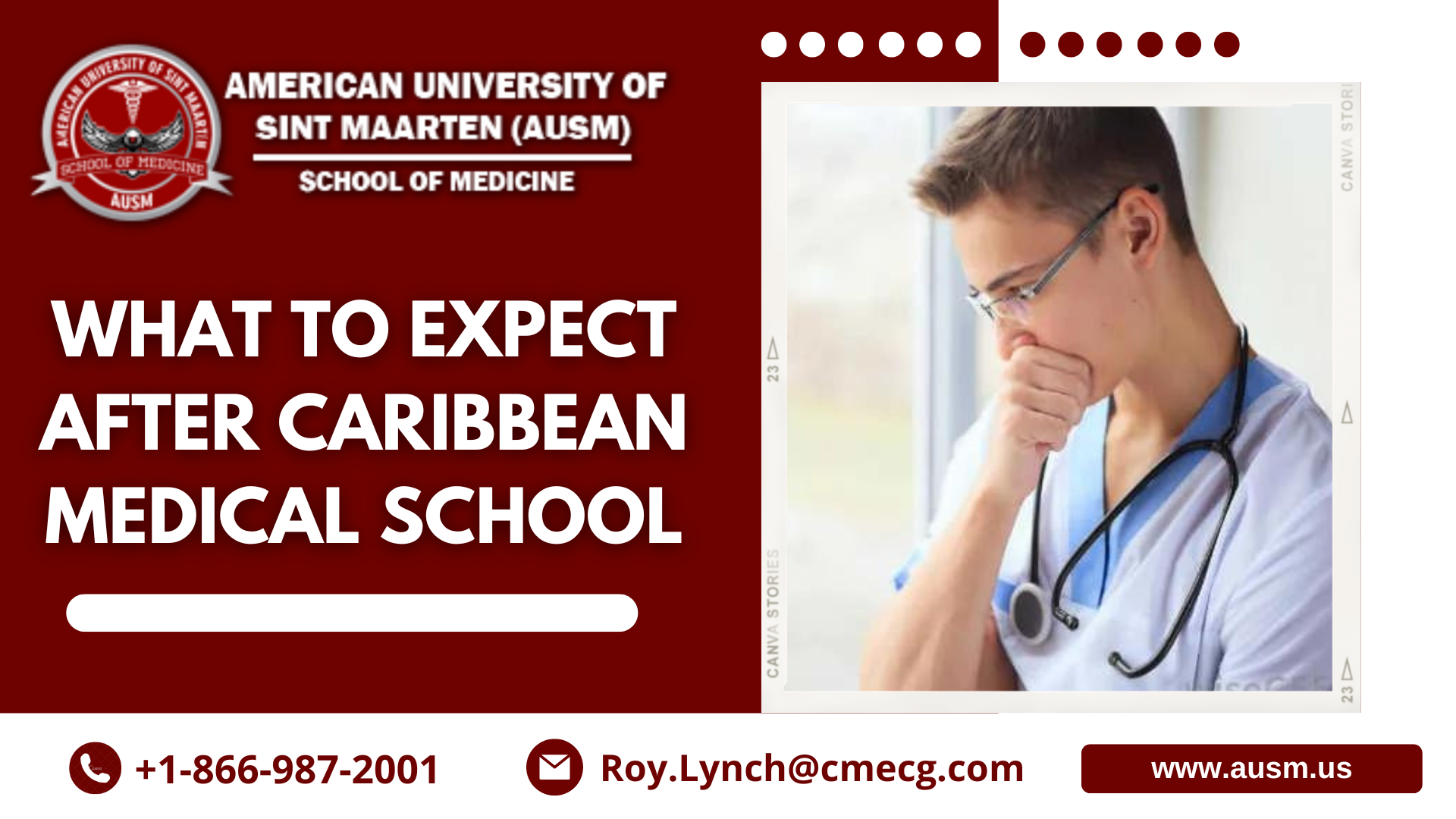
WHAT TO EXPECT AFTER CARIBBEAN MEDICAL SCHOOL
Are you curious about what happens after medical school? Here, American University of Sint Maarten
School of Medicine (AUSM) touches on what recent medical school graduates may encounter as
they embark on their new journey as physicians.
A medical education is hard work, so it can help to remember what’s after medical school. There
are rewards awaiting recent med school graduates—more than just the reward of becoming
physicians. Below are Six things to keep in mind as you work toward the goal of becoming a
medical professional.
WHAT HAPPENS AFTER CARIBBEAN MEDICAL SCHOOL - STARTING YOUR CAREER IN MEDICINE:
1. You have more control
Don’t get us wrong, being a doctor is hard work. But so is Caribbean medical school and
residency! The long hours and demanding studies can be stressful and tough. The good news is
that you will have more control over your schedule after residency.
It’s important to think about your ideal work/ life balance while you are still in Caribbean medical
school. The reason why is that some of the choices you make as a student, especially your choice
of specialty, can have a major impact on how many hours you work every week as a doctor, and
whether you have a “regular” nine-to-five schedule.
2. Specialty matters
Your medical career will largely be shaped by your choice of specialty. For example, if you have a
passion for dermatology, you will have the opportunity to set regular hours. On the other hand,
if you want to work in emergency medicine, long hours are part of the job . However, many
emergency medicine physicians find the unpredictable nature of the day exciting and a
worthwhile tradeoff.
There will be other factors to consider when it comes to your personal time, but your choice of
specialty may well have the greatest impact. Be sure to take this into account as you consider
what to do after Caribbean medical school.
3. New opportunities to build
Becoming a doctor can also mean becoming the owner of a small business. Many doctors open
private practices that they manage independently. There are pros and cons to this approach. The
pros are that you have total control over your practice and staff, and you can follow your personal
vision. The cons are that it can mean long hours and more risk, as any business carries risk. As a
recent Caribbean medical school graduate, you may want to take classes or seminars or find
another way to sharpen your business acumen.
Today, many young doctors choose an alternate path, such as employment by a health network
or hospital system. The attraction for the doctor is that it usually means fewer hours and a regular
schedule. You will not have to worry as much about revenue and administration. But you will also
have less control over policies and staff.
The point is that these are your decisions to make. You will have a wealth of options, in terms of
where you want to live and how you want to practice.
4. Success and confidence
You will begin your medical career with new confidence won from years of difficult but successful
training. Completing Caribbean medical school and residency is a major accomplishment. After
all, few people are even willing to try walking such a difficult path.
One success breeds another. That is, proving yourself in Caribbean medical school and residency
shows what you can accomplish through hard work, intelligence, and discipline. For most
physicians, obtaining a Doctor of Medicine (MD) degree is the first success of many.
5. Lifelong learning
What happens after medical school? The learning isn’t over. You may no longer be in a lecture
hall, but doctors never cease studying their specialty, and the rewards of lifelong learning are an
often overlooked part of medicine. Long after they have left school, physicians enthusiastically
snap up new research in their field. Their interest may be in learning about a rare condition,
boning up on the periphery of the field, researching conditions they see regularly, and finding
new methods to help patients.
You will also have the chance to conduct personal research, even if you do not teach at a
university. You are joining a community that builds and debates knowledge, for the practical
benefit of patients. Welcome to the party!
6. Trust and respect
Some students may be surprised by the change in their stature with family and friends. Do not
be surprised if people who once discounted your opinion now come to you for advice—it may
not even be for medical advice.
Of course, it is entirely up to you how much free advice, medical or otherwise, you wish to
dispense. You may find the need to set boundaries. But the point here is that when you are a
physician, your opinion on medical matters is an expert opinion, and people will take you
seriously.


